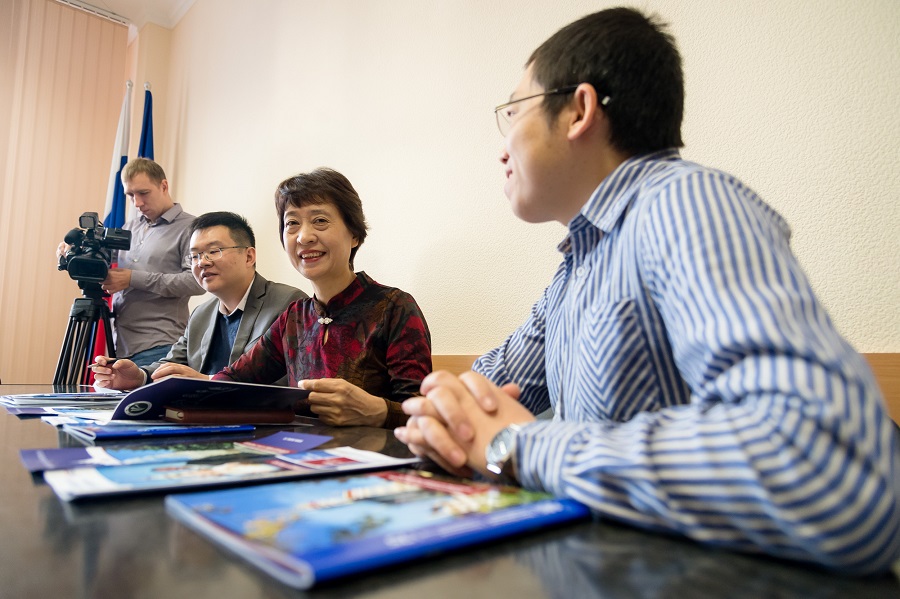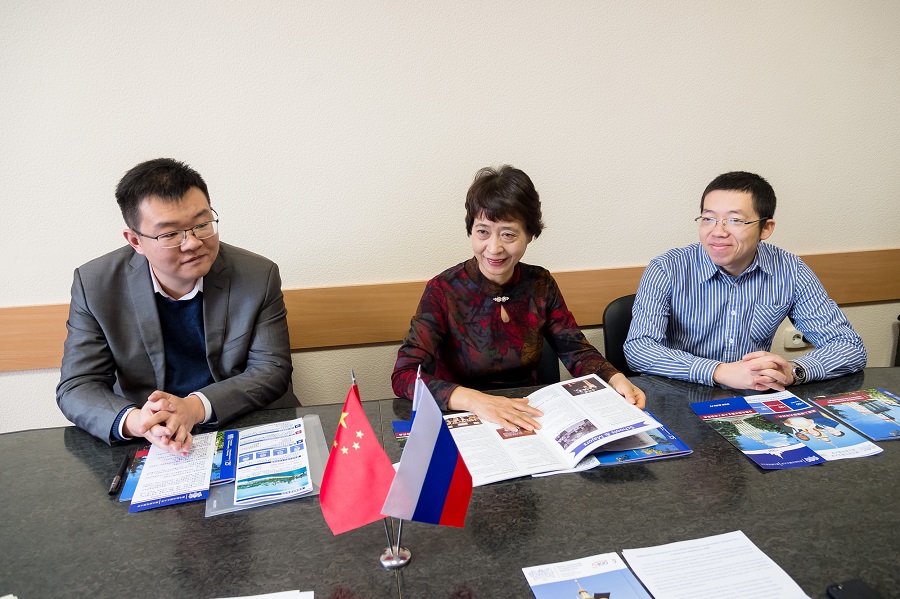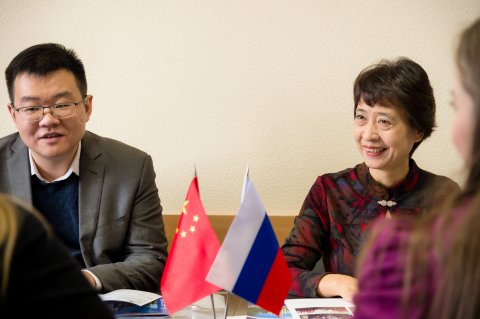A delegation from Xuchang University, China, visited South Ural State University November 18th through November 21st in order to discuss the development of international cooperation and joint educational projects on the Russian language and specialized fields for students and academic staff.
Xuchang University has been partners with SUSU since 2012, and an active fulfilment of students’ academic mobility programs has begun since 2017. Now SUSU and Xuchang University concluded a collaboration agreement and some additional agreements in certain fields: Xuchang students study at the Institute of Architecture and Construction, the Institute of Engineering and Technology, and at the School of Medical Biology at SUSU.
On the first day of the visit, the delegation from Xuchang University represented by Gu Ling, the Vice-Rector for Academic Affairs, and Niu Chicheng, the Secretary of the Academic Office, met Liudmila Lapina, the Head of the International Office and Julia Shmotina, the Head of the International Relations and Development, in order to discuss the ways of further international cooperation.
“We have been working with Xuchang University for several years now. Students from this university study at SUSU, our academic staff give lectures at the university in China, and now a new stage of our cooperation has begun. Our colleagues from China informed us they are ready to open new fields in the interuniversity cooperation and student exchange programs. Also, they need advanced training for their teachers of the Russian language and teachers in technical disciplines in the Russian language. We hope we will find new fields of common interest and will help our partners from China improve the quality of teaching,” shared Liudmila Lapina, Head of the International Office.

One of the main topics of the meeting was sharing with the academic staff from Xuchang University the resource books on teaching Russian language, as well as resource books on special disciplines in Russian, related to construction, electronics, and computer science. Besides, the leadership of Xuchang University expressed willingness to continue educational cooperation and further attraction of their students to study at SUSU.
“In the future we are planning to continue collaboration with SUSU in such forms as advanced training for academic staff of the Russian language, attending summer schools, and sending our students to SUSU to continue education. At the same time, we want our teachers to come here for research works in various scientific fields,” shared Gu Ling, Vice-Rector for Academic Affairs. “I think the best way for our students to study Russian is to study it in the context of different subjects and in the Russian environment.”
SUSU intends to develop the relations with Xuchang University and continue working in all the fields the guests may be interested in in the future. Within the framework of the visit of the delegation the following events took place: a meeting with the head of the Pushkin Institute Centre, visiting the Department of Russian as a Foreign Language of the Institute of Linguistics and International Communications, attending Russian language classes, talking with Xuchang students who study at SUSU, and going on a tour round scientific laboratories of the university.
Xuchang University has been a partner university with the SUSU Pushkin Institute since 2018. At the meeting, the guests were shown a presentation about the activity of the Centre, were told about the possible cooperation prospects looking back at the already accomplished work in organizing events on learning the Russian language. Besides, Iadviga Berezovskaia, the Head of the Pushkin Institute Centre, noted that they are ready to help develop resource books for academic staff teaching special disciplines in Russian.
“Now we are working in several fields with Xuchang University. Several activities for teachers, for example, a pedagogical excellence contest is held, where two teachers from this university participated. Also we organize webinars and master classes on pedagogical excellence on a regular basis; and as for the students, we offer master classes on mastering phonetics of the Russian language, both full-time and remotely. And traditionally, we hold educational events aimed at getting to know Russian culture: New Year, A.S. Pushkin’s Birthday, the Day of the Russian Language, Nationwide Dictation Quiz,” said Iadviga Berezovskaia. “We would like to expand these relations, and we always welcome feedback from our partner universities, so that they find the events we offer burning and relevant.”

Visiting the Department of Russian as a Foreign Language aroused the greatest interest of the guests. The parties discussed methods of teaching foreign languages, compared the characteristics of Russian and Chinese universities. It was noted that creating small-sized groups of students to study language in Russian universities, in comparison with Chinese, gives almost an individual approach to students and helps make learning more effective. Elena Kharchenko, the Head of the Department of Russian as a Foreign Language, spoke about the specifics of working with Chinese students.
“Today about 364 students from China study in our general educational programmes, and 71 students take the pre-university training courses. They come with different level of language mastery, and our task is to equalize it and prepare them for studying in our programmes. Surely, the progress might vary but it depends mainly on their skills and efforts. I must say Chinese students are known for showing keen interest, but they face some difficulties in the beginning, taking into consideration phonetic problems and different structure of the language itself. And students who already studied Russian in China face different problems: they know grammar perfectly well and know how to write, but it is hard for them to perceive speech and speak, because they are afraid to make mistakes.”
A nationally oriented course on phonetics of the Russian language was developed especially to help working with Chinese students at the Department of Russian as a Foreign Language. It takes into consideration the special features of the Chinese language and is supplemented with subtitles. Moreover, the department is constantly working on creating its own resource books to explain speech models of the language to international students.
“I saw SUSU with my own eyes, it is actually a historical place. All teachers are really friendly and invite international students to come to study at their university,” shared Niu Chicheng. “Your students study in small groups, and this is very good since everyone has an opportunity to speak to a teacher individually. I think that is very efficient.”
For two days, the guests were attending the Russian as a Foreign Language classes and, together with students, were trying to test the methods of language teaching in Russia on themselves. The final day of the visit included visiting the SUSU scientific laboratories, such as the Synthesis and Analysis of Food Ingredients Laboratory, the Nanotechnology Research and Education Centre, the Laboratory of Physical Research, the Laboratory of Mechanics, Laser Processes and Digital Production Technologies.




